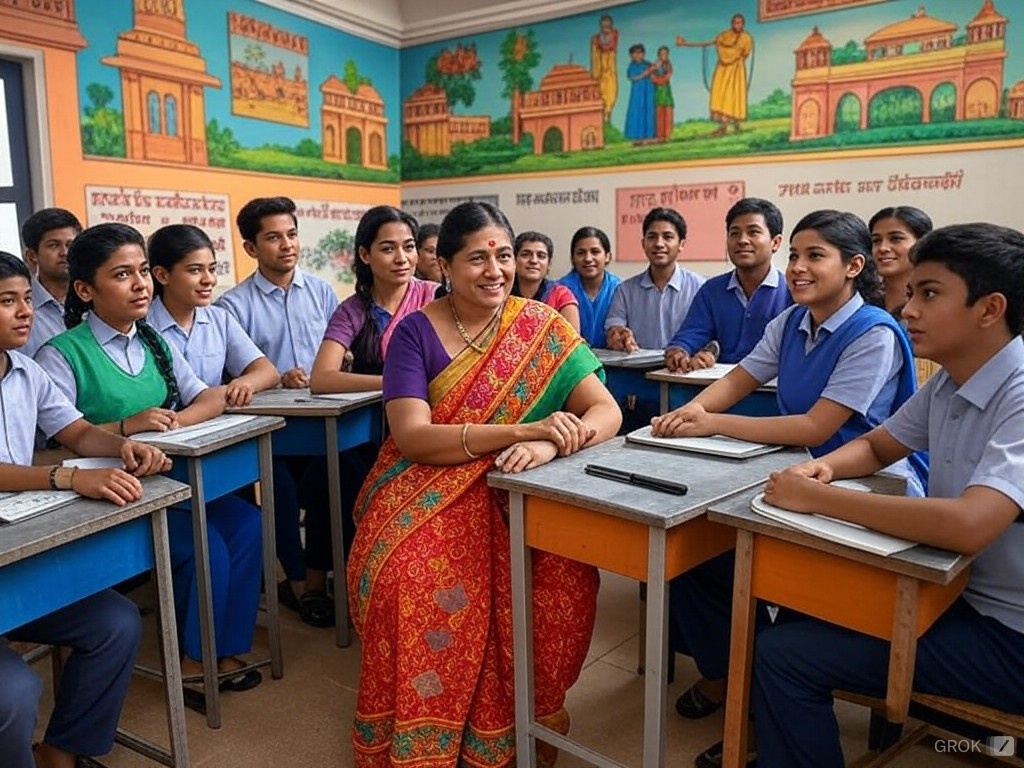Pedagogy in India: A Journey Through Time, Theory, and Transformation Introduction

India's educational landscape, with its deep roots in ancient wisdom and modern aspirations, presents a unique study in pedagogy. This detailed article will delve into the historical evolution, theoretical underpinnings, contemporary practices, and the multifaceted challenges of pedagogy in India, aiming to provide a comprehensive view of how teaching and learning have progressed and where they are headed.
Historical Evolution of Pedagogy in India
- Ancient Period (Vedic to Gupta Era):
- Gurukul System: Education was imparted in ashrams where students lived with their Guru, learning Vedas, philosophy, science, and arts through direct interaction, observation, and participation in daily life. This system emphasized moral and spiritual growth alongside academic learning.
- Oral Tradition: The transmission of knowledge was predominantly oral, fostering memory, recitation skills, and the practice of debate (Shastrartha).
- Medieval Period:
- Madrassas and Makhtabs: With Islamic rule, education expanded with institutions focusing on Islamic theology alongside secular subjects like astronomy, mathematics, and medicine.
- Nalanda and Taxila: These were centers of learning that attracted scholars from across Asia, showcasing India's role as an educational hub until their decline due to invasions.
- Colonial Influence (18th to mid-20th Century):
- Macaulay's Minute: Introduced in 1835, it shifted education towards English medium schools, focusing on producing clerks for the British administration, promoting rote learning over understanding.
- Critique and Reform: Intellectuals like Rabindranath Tagore established institutions like Visva-Bharati, advocating for an education system centered on creativity, nature, and cultural identity.
- Post-Independence Era:
- Constitutional Commitments: Education as a right was enshrined in the Indian Constitution, leading to policies for universal education.
- Kothari Commission (1964-66): Advocated for a common school system and stressed educational quality, leading to the National Policy on Education in 1968.
Theoretical Frameworks and Pedagogical Practices
- Indigenous Pedagogical Approaches:
- Gandhian Education: Emphasized self-reliance, manual labor as part of education (Nai Talim), and community involvement.
- Tagore's Philosophy: Learning in harmony with nature, freedom of thought, and integration of arts in education.
- Western Educational Theories:
- Behaviorism: Influenced by Pavlov and Skinner, it was adopted for its structured approach, especially in teacher training, focusing on observable learning outcomes.
- Constructivism: Inspired by Piaget and Vygotsky, leading to experimental projects like the Hoshangabad Science Teaching Programme, which promoted learning through discovery.
- Modern Pedagogical Innovations:
- National Curriculum Framework (NCF) 2005: Pushed for a shift from content-heavy to competency-based education, promoting learning through experiences and critical thinking.
- Activity-Based Learning (ABL): Originating from places like Rishi Valley, it focuses on learning through activities, tailored to different learning paces.
Contemporary Practices and Policies
- National Education Policy (NEP) 2020:
- Multidisciplinary Education: Encourages blending arts with sciences, promoting a holistic educational approach.
- Early Childhood Care and Education (ECCE): Recognizing the foundational importance of early education.
- Technology in Education: Advocating for digital tools but emphasizing the need for digital infrastructure.
- Teacher Education and Professional Development:
- DIETs and SCERTs: Institutions aimed at improving teacher training, though they face challenges in quality and relevance of training.
- Inclusive Education:
- Efforts to integrate children with special needs into mainstream education through special educators and adapted teaching methods.
Challenges Facing Pedagogy in India
- Quality of Education: Disparities in educational quality between urban and rural areas, and between private and public schools.
- Teacher Shortage and Quality: Despite numerous training programs, many teachers lack modern pedagogical skills due to inadequate training or rapid policy changes.
- Language Barriers: English as a medium of instruction often alienates those from non-English backgrounds, affecting learning outcomes.
- Assessment Systems: Predominantly exam-oriented, which can stifle creativity and deep understanding, though there's a move towards competency-based assessments.
- Cultural Integration: Balancing global educational trends with India's diverse cultural and linguistic heritage.
- Technology Access and Digital Divide: While digital education is on the rise, not all students have equal access to technology.
Future Directions
- Research and Innovation: More emphasis on educational research to tailor pedagogy to Indian contexts.
- Professional Development: Continuous, in-service training for teachers that's aligned with current pedagogical theories and practices.
- Community Engagement: Strengthening ties between schools, parents, and communities to enhance learning environments.
- Cultural Pedagogy: Incorporating local knowledge systems, languages, and arts into the curriculum to make education culturally relevant.
- Policy Implementation: Ensuring that ambitious educational policies translate into practical, beneficial changes in classrooms across the nation.
Conclusion
Pedagogy in India is at a dynamic junction where it must reconcile traditional methods with contemporary needs, ensuring that education is not only accessible but also meaningful, inclusive, and forward-looking. The path forward involves learning from both its rich history and global best practices to shape an education system that truly empowers its diverse populace.
